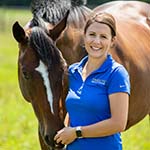They say the least expensive part of owning a horse is the purchase price…or something like that. The reality is that the long-term general care and upkeep of a horse is expensive, and a large part of that expense is in horse feed.
The Components of Horse Feed
Bagged horse feeds, often called a concentrate or “grain”, are comprised of a combination of ingredients designed to provide:
- Macronutrients – protein, fat, fiber
- Micronutrients – vitamins and minerals
- Energy (calorie) sources
Horse feeds are designed to help fill in the gaps that even the best quality forage cannot fill. For all horses, this will be some macronutrients and many micronutrients. For some horses, like the hard keeper, additional energy is needed as well.
The ingredients used in modern horse feeds have moved away from heavy reliance on traditional grains, like corn, oats and barley, as research has revealed the negative health impacts of high non-structural carbohydrate (NSC) diets. Instead, ingredients high in digestible fiber are incorporated more frequently and many higher fat formulations are readily available. Notably though, digestible fiber sources and fat are more expensive than the traditional high NSC ingredients.
The level of fortification with micronutrients, as well as the quality of the ingredients used, will impact the cost of a horse feed. Some feeds will also include feed additives, such as pre and probiotics to support gut health.
Evaluating the Value of Horse Feed
Value is a tricky concept, because the least expensive option often does not offer the greatest value; however, the most expensive option also may not offer the greatest value.
The most economical and highest value way to provide essential nutrients with minimal added energy is through a ration balancer, like Essential K, even though the cost per bag on a ration balancer is higher than that of a complete feed.
Essential K
Cost per 50 lb bag: $31.99
Daily feeding rate at maintenance for a 1,000 lb horse: 1 lb
Daily feeding cost: $0.64
$31.99/50 lb = 0.64/lb X 1 lb = $0.64
Kalm ‘N EZ
Cost per 50 lb bag: $24.99
Daily feeding rate at maintenance for a 1,000 lb horse: 4 lb
Daily feeding cost: $1.99
$24.99/50 lb = 0.49/lb X 4 lb = $1.99
While Essential K does a fantastic job of filling in the non-energy nutrient gaps in the diet, if Essential K won’t provide enough calories to support a healthy body condition and performance, it is not going to be the best value for your horse. A traditional horse feed, which is designed to deliver nutrients and calories, would be a better choice. Higher fat feeds, particularly for harder keepers, may be more expensive per bag, but are often a greater value because you feed less. Feeding less helps keep the cost per day down but is also helpful in supporting digestive health.
The best way to evaluate the value of horse feed is to look at the cost of feeding the horse each day. Keep in mind, supplements count in this equation as well, and the quality of your forage will significantly impact the quantity of additional calories you need to supply through a horse feed.
Intangible Benefits
The composition of the feed and specific nutrients are a large part of the value equation in horse feed; however, those alone can’t capture the importance of factors like safe manufacturing and fixed formulas.
Unsure if you are getting the most value from your feeding program? We can help! Please reach out for a free, personalized feeding plan.

